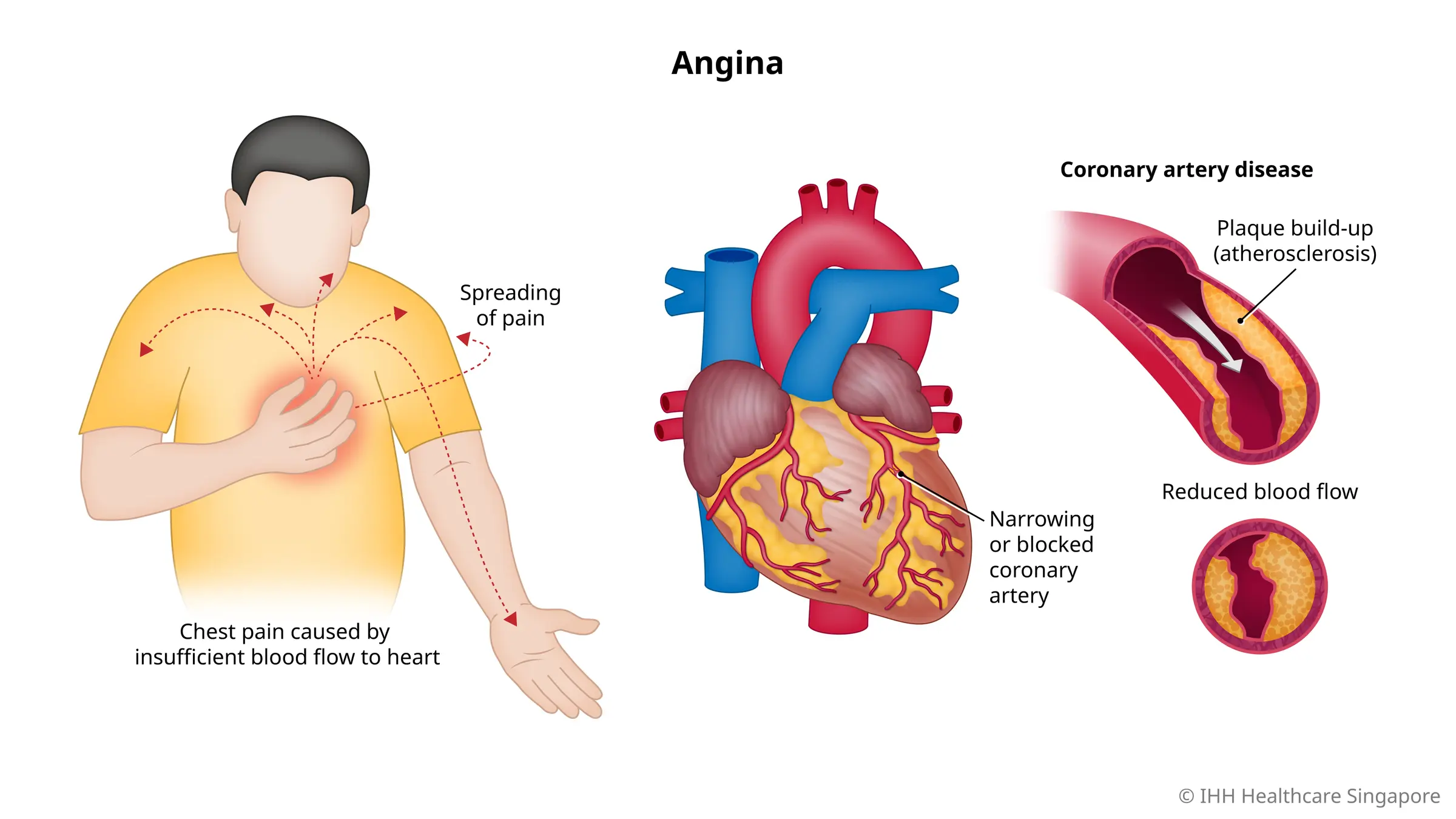-
-
Featured Care Areas

Angina Pectoris (Chest Pain)
What is angina?
Angina is the chest pain or discomfort which happens when your heart does not get enough oxygen-rich blood, a condition known as ischaemia. This is usually due to one or more of your coronary arteries being partially or fully blocked.
Angina is often described as pressure or squeezing in your chest. Sometimes this discomfort can also occur in your shoulders, arms, neck, jaw or back.
Although it is not a disease itself, angina is a sign that you may have coronary artery disease.
Women are more likely to suffer from angina than men.
Types of angina
There are several types of angina.
- Microvascular angina, which is usually noticed during daily activities and when you feel mentally stressed out. It may also occur with shortness of breath, sleep problems, fatigue and lack of energy.
- Stable angina, which develops during physical exertion, such as when you exercise or climb the stairs. It disappears once you rest or take medication.
- Unstable angina, which develops even at rest. It is unexpected and usually more severe and lasts longer than stable angina. It may not disappear even if you rest or take medication. It may also signal a heart attack.
What are the symptoms of angina?
The main symptoms of angina are chest pain and discomfort, particularly feeling a squeezing sensation or pressure in your heart.
Other symptoms include:
- Dizziness
- Fatigue
- Nausea
- Pain in arms, neck, jaw, shoulder or back
- Shortness of breath
- Sweating
When to visit the UCC
If your chest pain lasts longer than a few minutes and does not stop when you rest or take angina medications, this may be a sign of a heart attack.
Call 6473 2222 to visit our 24-hour Urgent Care Centre (UCC) clinic immediately. Or call 995 for Emergency Medical Services (EMS).
What causes angina?
Angina occurs when there is reduced blood flow to your heart muscle. Blood carries oxygen, which is essential to your heart muscle.
The most common reason why reduced blood flow happens is coronary artery disease. It develops when fatty deposits, called plaque, build up in the blood vessels that supply blood and oxygen to the heart. This buildup is also known as atherosclerosis.
When you are resting, your heart muscle may still be able to cope with reduced blood flow without triggering angina symptoms. However when you increase demand for oxygen, such as when you exercise or do a strenuous activity, angina can occur.
What are the risk factors for angina?
The following factors may increase your risk of suffering from coronary artery disease and angina.
- Diabetes. Diabetes increases the risk of coronary artery disease and angina by increasing cholesterol levels and speeding up atherosclerosis.
- Family history of heart disease. If your parents or siblings have a history of heart disease or angina, you have a higher risk of developing angina.
- High blood cholesterol or triglyceride levels. If you have an unhealthy diet, you may be more likely to have high levels "bad" cholesterol also known as low-density lipoprotein (LDL) cholesterol and triglycerides (a type of blood fat). These increase your risk of angina and heart attacks.
- High blood pressure, which speeds up the hardening of your arteries.
- Lack of exercise. A sedentary lifestyle can contribute to high cholesterol, high blood pressure, type 2 diabetes and obesity.
- Older age.
- Obesity, which is linked to high blood cholesterol levels, high blood pressure and diabetes. If you are overweight, your heart has to work harder to supply blood to your body.
- Stress.
- Tobacco use. Smoking, chewing on tobacco and long-term exposure to second hand smoke damage the walls of your arteries. This allows cholesterol to deposit and block blood flow.
What are the complications and related diseases of angina?
The chest pain and discomfort due to angina can make normal activities, such as walking, uncomfortable.
The most dangerous complication of angina is a heart attack.
How do you prevent angina?
You can lower your chances of experiencing angina by making lifestyle changes such as:
- Eating a healthy diet and maintaining a healthy weight.
- Exercising more frequently, unless your doctor has concerns.
- Getting a flu shot every year to avoid heart complications from the influenza virus.
- Limiting alcohol consumption. Men should not have more than 2 drinks a day, and women should not exceed 1 drink a day.
- Monitoring and controlling other health conditions such as high blood pressure, high cholesterol and diabetes.
- Quitting smoking and reducing exposure to secondhand smoke.
- Reducing your stress level.
This page has been reviewed by our medical content reviewers.
Need help?
For enquiries, please call
+65 6575 7575
For appointment bookings, please WhatsApp
+65 8111 9777



